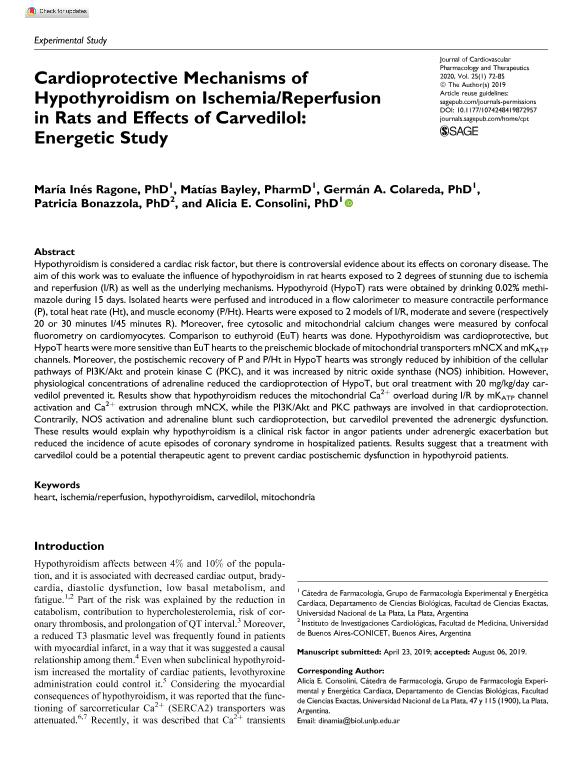Artículo
Cardioprotective Mechanisms of Hypothyroidism on Ischemia/Reperfusion in Rats and Effects of Carvedilol: Energetic Study
Ragone, María Inés ; Bayley, Matias
; Bayley, Matias ; Colareda, German Andres
; Colareda, German Andres ; Bonazzola, Patricia
; Bonazzola, Patricia ; Consolini, Alicia Elvira
; Consolini, Alicia Elvira
 ; Bayley, Matias
; Bayley, Matias ; Colareda, German Andres
; Colareda, German Andres ; Bonazzola, Patricia
; Bonazzola, Patricia ; Consolini, Alicia Elvira
; Consolini, Alicia Elvira
Fecha de publicación:
01/2020
Editorial:
SAGE Publications
Revista:
Journal Of Cardiovascular Pharmacology And Therapeutics
ISSN:
1074-2484
e-ISSN:
1940-4034
Idioma:
Inglés
Tipo de recurso:
Artículo publicado
Clasificación temática:
Resumen
Hypothyroidism is considered a cardiac risk factor, but there is controversial evidence about its effects on coronary disease. The aim of this work was to evaluate the influence of hypothyroidism in rat hearts exposed to 2 degrees of stunning due to ischemia and reperfusion (I/R) as well as the underlying mechanisms. Hypothyroid (HypoT) rats were obtained by drinking 0.02% methimazole during 15 days. Isolated hearts were perfused and introduced in a flow calorimeter to measure contractile performance (P), total heat rate (Ht), and muscle economy (P/Ht). Hearts were exposed to 2 models of I/R, moderate and severe (respectively 20 or 30 minutes I/45 minutes R). Moreover, free cytosolic and mitochondrial calcium changes were measured by confocal fluorometry on cardiomyocytes. Comparison to euthyroid (EuT) hearts was done. Hypothyroidism was cardioprotective, but HypoT hearts were more sensitive than EuT hearts to the preischemic blockade of mitochondrial transporters mNCX and mKATP channels. Moreover, the postischemic recovery of P and P/Ht in HypoT hearts was strongly reduced by inhibition of the cellular pathways of PI3K/Akt and protein kinase C (PKC), and it was increased by nitric oxide synthase (NOS) inhibition. However, physiological concentrations of adrenaline reduced the cardioprotection of HypoT, but oral treatment with 20 mg/kg/day carvedilol prevented it. Results show that hypothyroidism reduces the mitochondrial Ca2+ overload during I/R by mKATP channel activation and Ca2+ extrusion through mNCX, while the PI3K/Akt and PKC pathways are involved in that cardioprotection. Contrarily, NOS activation and adrenaline blunt such cardioprotection, but carvedilol prevented the adrenergic dysfunction. These results would explain why hypothyroidism is a clinical risk factor in angor patients under adrenergic exacerbation but reduced the incidence of acute episodes of coronary syndrome in hospitalized patients. Results suggest that a treatment with carvedilol could be a potential therapeutic agent to prevent cardiac postischemic dysfunction in hypothyroid patients.
Palabras clave:
CARVEDILOL
,
HEART
,
HYPOTHYROIDISM
,
ISCHEMIA/REPERFUSION
,
MITOCHONDRIA
Archivos asociados
Licencia
Identificadores
Colecciones
Articulos(ININCA)
Articulos de INST.DE INVEST.CARDIOLOGICAS (I)
Articulos de INST.DE INVEST.CARDIOLOGICAS (I)
Citación
Ragone, María Inés; Bayley, Matias; Colareda, German Andres; Bonazzola, Patricia; Consolini, Alicia Elvira; Cardioprotective Mechanisms of Hypothyroidism on Ischemia/Reperfusion in Rats and Effects of Carvedilol: Energetic Study; SAGE Publications; Journal Of Cardiovascular Pharmacology And Therapeutics; 25; 1; 1-2020; 72-85
Compartir
Altmétricas



